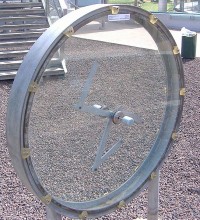This year the lecture day at the Weizmann Institute for teenagers will be held on January 4, 2011

Hundreds of teenagers come every year to the day of popular science lectures named after Amos de Schlit, held at the Davidson Institute for Science Education at the Weizmann Institute of Science in Rehovot. The lectures, which have been held continuously since 1971, present topics from the forefront of science in a variety of scientific topics and in an accessible language. The lectures are attended by classes and groups of students from all over the country, but also individual students and adults interested in science.
This year the day of lectures will be held on January 4, 2011 from 10:15 am to 15:00 pm in Weeks Hall. This year's lectures will deal with particle physics, microorganisms and chaos theory.
In the first lecture, which will begin at 10:15 under the title: "In Search of the Higgs Boson", Prof. Elam Gross, from the Department of Particle Physics and Astrophysics at the Weizmann Institute, will present the search for new particles that are not yet in the textbooks. In the particle accelerator in Geneva, which has been churning out protons at enormous energies for about a year now, physicists have been busy searching for even the faintest hint of the Higgs particle (the "God" particle) which is needed to explain how elementary particles get their valve. In this lecture Prof. Gross will focus on the Higgs particle and the race to discover it.
The second lecture, entitled "On the ability of microorganisms to "predict" changes in their environment" will be delivered by Prof. Tzachi Falpal, from the Department of Molecular Genetics at the Weizmann Institute. The lecture will begin at 11:45, during which Prof. Pepper will describe a new study that reveals surprising abilities of "predicting" changes in the growing conditions of various microorganisms. The lecture will also discuss the evolutionary forces that ascertained details based on their ability to predict, and the feasibility of evolution experiments in the laboratory, to ascertain new predictive abilities.
At 13:00 there will be a lecture by Prof. Ward Rom-Kider, from the Department of Computer Science and Applied Mathematics at the Weizmann Institute, under the title "Billiard Tables - Chaos, Randomness and Particle Movement". The lecture will present and examine the Boltzmann hypothesis, which is the basis for the theory of statistical mechanics, which is one of the cornerstones of modern physics. Boltzmann, one of the giants of physics of the 19th century, claimed that the behavior of gas molecules in a box is similar to the behavior of billiard balls, and that their movement can be considered random. Prof. Rom-Kider will tell about what we know mathematically (using chaos theory) and laboratory experiments that are done to test new aspects that we have found with the help of mathematics.

One response
Will it be possible to watch the lectures online later?